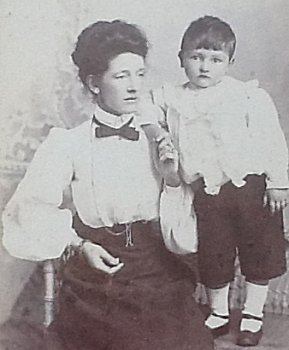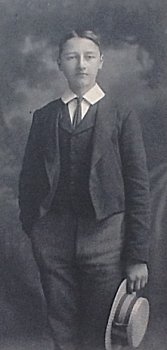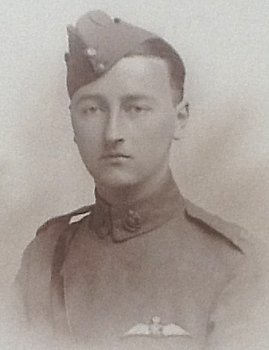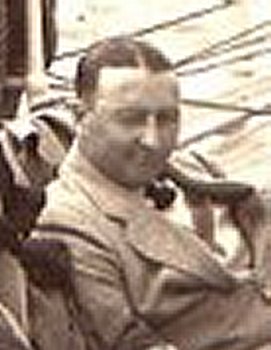



Updated 26 Mar 2015 |
WIRKSWORTH Parish Records 1600-1900 |
Return to Front Page |
RFC Pilot's Autobiography |
Thomas K BREAKELL was born in Brassington, Derbyshire in 1895, son of a mining engineer. More information can be found about him on X485. He died in Ashbourne, Derbyshire in 1963, aged 68. Scans supplied by Claire Astbury |
Thomas K BREAKELL, 1895-1963 |
 |
 |
 |
 |
---------------Page 1----------------------------- TAKE OFFs NO RAKE OFFS My interest in flying started when I was at school in 1909. I was 14 years old. Many pioneers, The Wright Bros, Colonel Cody, Bleriot, and others were startling the world with their exploits in weird looking "Flying Machines" made of bamboo and braced with piano wire, by most people they were regarded as a little mad, very few people had the vision to see that it was the beginning of the Air Age. Hardly a week went by without one of these intrepid men losing his life in a mishap. In that year, an Aero exhibition was staged at Olympia, there were many "life-sized" machines, but more models, some of these models were strange looking contraptions that had not the slightest chance of achieving flight, but they were all made to some theory of the Inventors who had complete faith in them. So little was known at that time of "Theory of Flight" that many of the Inventors must have dreamed their Inventions, perhaps "Nightmares" would be nearer the mark? One exhibitor, a Cornishman, had no money, left when he had completed his model, and had walked all the way from Cornwall, carrying it
My father took me to the Exhibition, and he himself became infected with the Flying 'Bug'. He was a mining Engineer and had invented many useful machines for Mining purposes. When we got home he sat down at his drawing board and invented an Aeroplane, just like that!
His machine consisted of four Box-kites, mounted on a frame-
work, two in front, two behind. The 'Angle of incidence' or 'Angle
of attack' of each kite could be varied by the Pilot, who sat in
the middle of the four kites, there were no rudders or ailerons, the
idea was that if the pilot wished to turn to the left he gave the
My Father, who was a very good amateur carpenter, built a model, it took a considerable time and he expended a lot of care on details. It measured when completed about five feet across and seven feet in length, each kite being about two feet by three. The motive power was supplied by two "pusher" airscrews driven by thick catapult elastic, each airscrew blade was a foot long and three inches wide, more of a fan than an airscrew, we tested them in the workshop, they whizzed round and made quite a breeze! Our workshop was in the harness room of our stables, and as the model was too large to work on there when assembled it was transferred to the loft outside and suspended from a beam. As there were adjustments to be made before it could be "Flight Tested" it was left suspended with some tension on the elastic and pins to prevent the airscrews turning. Unfortunately the door of the loft was left open and an inquisitive cow walked in, she must have liked the taste of the varnish, but while trying it she dislodged one of the pins and allowed an airscrew to revolve, the cow, now thoroughly startled by the strange behaviour of a prospective dinner, decided to go out again, she had got her horns in the framework and the aeroplane went out with her, as it could only be got through the door by holding it sideways and exercising great care, there was not much left when she got outside. I have seen many crashes since, but none was more thorough than this. However, I think that cow may have unwittingly saved someone's life! My Father was very disappointed, but he did not build another. Shortly after this we were in London again, and one Sunday we went to Hendon, where there was always some Flying to be seen, Bleriots, Farmanns, and H C Barber's tail-first "Valkyrie" were flying on that particular day.
-----------------Page-3----------------------------------------- "Monsieur so-and-so" would make a flight in someone's famous aeroplane, a Bleriot, I think but I cannot remember. There was a loud buzzing of the Gnome engine, the Mechanics holding the wings, let go. (no one appears to have thought of chocks in those days) the machine rushed forward, leapt about twenty feet, and crashed nose first. Monsieur so-and-so had broken his neck. My Father said "That's That" and we went home. This of course should have killed my desire to fly but it did not. My Father, as I have said before was a Mining Engineer, and a very well known one, most of my relatives were connected with mining. My Father's pockets were usually full of ore samples and our house was littered with rocks against which one constantly stubbed ones toes. It would have been strange, if, brought up in this atmosphere, I had not decided to become a Mining Engineer myself, it was not that I was interested in it but I had been brought up on it and could think of nothing else. I had lived on a gold mine in Venezuela as a child and later on, a Copper mine in the Caucasus.
The older I got and the more I saw of Mining, the more I disliked the idea of it. This occasioned many disagreements between my Father and myself, as he was very keen on his job and loyal to his particular crowd of oily Financiers he was working for.
--------page 4-------------------------- During one of my many rows with my Father over my lack of interest in Mining, I said to him "give me £100 to learn to fly at Vickers, and I'll never darken your doorstep again" or something like that. My Mother was horrified at the idea and told me some story of a woman in the village whose small boy, when she threatened to wallop him, said that if she did he would jump down the well, whereupon she would relent and say "Oh, Willy, please don't jump down the well". I could never see any connection between Willy and my desire to fly but my Mother evidently did, and a great many other people had this attitude towards flying in 1913. I continued my Mining studies and was at Redruth School of Mines at the outbreak of World War No.1. I had always been keen on soldiering and while living in London in 1910 I had joined the "Artists Rifles". When I went to Cornwall I was attached to the Redruth Company of the Duke of Cornwall's Light Infantry to complete my four years Territorial service. I was recommended for a Commission and in May 1914 I was gazetted a 2nd Lieutenant. This again, my Father could not understand as it would give me (or rather him) unnecessary expense as I was supposed to be taking up a job as assistant Assayer and Surveyor to a Mining Company in Siberia, for whom my Father was Consulting Engineer. I was to leave for Siberia in September 1914.
Before we declared war on Germany I was notified by the
London office of the Company, that owing to the unsettled state
of things after the Sarajevo murders, my job was uncertain.
After August 4th 1914, I never gave it another thought as I
immediately joined my Battallion on Mobilisation. The War station
of the 4th Batt. was Pendennis Castle, Falmouth. I proceeded there,
very proud of myself in a new service dress uniform, complete with
sword, we wore swords in those days, mine which was obtained from
a well-known military outfitters, whose name proclaimed them as of
the Chosen Race, had D.R.G.M stamped on the guard. When you bent
it, it stayed bent! A British Infantry Officers sword made in
One of my first duties was Officer i/c Guard on a German ship that was brought into Falmouth by a Destroyer on the first day of the war. This was the "Kronprinzessin Cecilie", not the large liner of that name, but a boat of about 8,000 tons, that had originally been used by the Kaiser for his tour of the East some years previously. This duty was very pleasant as I had the First Officer's cabin, plenty of cigars and the best of wines, the passengers, who had here been detained on board for several days were chiefly Americans, they thought everything was "cute" including myself and sword! Unfortunately this duty did not last long as we were sent to Salisbury Plain for training. The 7th Royal Fusiliers took over our Garrison duties. After a period of dusty route marches about the Plain, the Battallion was split up into detachments, for various Guard duties. I was sent with a Company to guard bridges at Rugby. The detachment was under the command of a Captain and the senior N.C.O. was a Colour-Sergeant. (We still had the old single company system). Both the Captain and the Col.Sergt. were "sweats" of the old School, and had been drinking pals for years. On one of the rare occasions when a parade of the whole detachment was held, they came on parade arm-in-arm, and singing!, this was very embarrassing for us as in those days I had very "cut-and-dried" ideas about Military Discipline. However the difficulty solved itself as they both drank themselves medically unfit and were later discharged on these grounds. A new detachment commander arrived, I do not remember his name but he was a decent bloke, who left everything to me and I enjoyed my brief authority.
Bridge guarding became very boring as no one was sporting
enough to try and blow them up. We had one incident which went a
little way to relieving the monotony, a chap on a T.T."Indian"
motor bike made a habitof dashing under a bridge despite the Sentry's
About this time I saw an advertisment in the Press, it read "mechanics wanted for the Royal Flying Corps, apply Adjutant, Administrative centre, S.Farnborough". This revived my interest in Flying and I said to myself, "If they are short of mechanics, they are probably short of Pilots also." I immediately wrote a nice friendly letter to the Adjutant, S.Farnborough. About a week later I received a rather terse reply. "With reference to your application for to join the Royal Flying Corps, this application should be approved by your O.C. and G.O.C. and forwarded to Director of Military Aeronautics, Whitehall." I concluded that, not knowing the ropes, I had made a "bloomer" and left it at that. Shortly afterwards, all detachments were called in, Batt H.Qrs now being at Newquay. I cannot remember what had happened to the Detachment Commander but the job of taking them there devolved on me. We entrained about 80 strong, but arrived at Newquay with roughly half that number, various members having missed the train at stopping places en route, when they got out for cups of tea etc. It was a poor show but not altogether my fault as many of the "missing" were N.C.O's. whom I had sent to round up the others. However, most of them eventually turned up at Newquay.
When we arrived, I "fell in" the survivors and marched them
to where the Batt. should have been, only to find that they had
departed the night before for Cramlingham, Northumberland.
However, billets and food were found for us and the following day
we entrained for Cramlingham, this time no one was lost.
A reason for our move was given to us at a later date, this was that the War Office dept concerned had ordered the 5th Batt. Durham Light Infantry, (D.L.I.) to Cramlingham, they were stationed fairly close, but some dim-witted Civil servant managed to stick a "C" in the message, so that the 5th D.C.L.I. were moved there. From my later experience of War Office and Civil Servant efficiency, this explanation sounds quite reasonable. Our job at Cramlingham was to march out every day at dawn, nearly always in heavy rain, and dig trenches for the defence of the N.W. coast, usually in the most marshy ground that could be found for us. As fast as we dug the trenches, so they filled with water and fell in no matter how well we revetted them, we thought we had a job for the duration, and we were rapidly becoming amphibious. The night I arrived, no billet having been found for me, I was given the bedroom of the 2nd in Command, who was on leave, this was in the village location the "Travellers Rest". I went to bed about 10 o'clock, and, sitting in an armchair in front of the fire, fast asleep, was a quite comely young serving wench, I woke her up and she said she was sorry, but being very tired, after getting the room ready for the night she had sat down for a rest and fallen asleep. This may have been true, but after that I always had an enhanced respect for the 2nd in Command, he was an elderly bloke with a large family, but one never knows! Our O.C. at this time was Colonel Pleydell-Bouverie, a fine soldier but inclined to be a bit crotchetty, the Troops called him Colonel Play-hell something-or-other.
I did not see much future in trench digging, and when an Officer
and thirty men were asked for the 6th Devons, to bring them
A few days after I got back, while on early parade, the Adjutant called me over and said "Breakell, have you been fooling about with the Flying Corps?" I admitted that I had written a letter while at Rugby, but in view of the reply I had received I thought no more about it. He then showed me a telegram which read "2nd Lieut.T.K.Breakell will report to Adjutant R.F.C. S.Farnborough immediately" The Colonel was a bit peeved at my irregular way of doing things, but said that "if I wanted to play with those damned Flying Machines", he supposed I must. His parting advice to me was "don't tumble". I left by a very early train the following morning, and at Darlington, through which station we passed very slowly, there were crowds of people in various stages of dress or undress. Then we got to York, our first stop, there were even larger crowds, and a chap got into my carriage. He had a lot of sticking plaster on his face and I asked him what was afoot, he told me that he had been staying at a hotel on the Front, and while shaving that morning, he looked out of the window and saw what he took to be part of our "mighty Navy", "but" he said, " while I was thinking what a wonderful Navy we had, they went off bang and I cut myself". This was the morning that the Huns shelled Hartlepool and Scarborough.
-------------page 9--------------------- in the following morning, till then my time was my own. I collected my kit from the Hotel and went to my billet which was "The White House" Guildford Road. As I arrived at the door a R.N.A.S. car drove up with a very mud-begrimed Sub.Lieut, he was covered with scratches and blood and his uniform was badly torn, notwithstanding his condition he seemed very cheerful. The Lady of the house introduced me to him, he was Flight Sub. Lieut Scott, or rather "Probationary Flight Sub Lieut Scott". I asked him what had happened to him and why he was so cheerful, he said "I've just passed my 'Free Balloon' flight, made a good landing and got full marks" he said he had covered about 80 miles, and let out some gas to make a landing, but his grapnel had broken away and he had been dragged through several hedges before he could fully deflate the balloon. I said "If you call that a good landing, what on earth is a bad one like?". He said "last week on my first attempt, I found I was losing height over Aldershot, so I dropped some ballast to rise, my grapnel caught on an Iron balcony, my balloon shot up and I drifted across Aldershot swinging the balcony underneath and knocking off chimney pots by the dozen". Flt Sub Lieut Scott, afterwards Captain, was killed in Airship R.101. I met him again in 1917. One of the other occupants of the house was Captain L.V.S.Blacker, afterwards Colonel Blacker, of Everest Flight fame.
On arrival at the Flight sheds, I reported to the Adjutant and was sent to draw flying kit, read standing orders etc after which I reported to my Flight Commander and was shown the aeroplane on which I was to get my instruction. This was a "Maurice Farman Long-Horn"
-------------page 10--------------------- and struts, in fact it was always said of these machines, that to see if they were properly rigged, a canary was put inside and if it couldn't get out the aircraft was O.K. but if it escaped there must be wire missing! One of the things that impressed me was the characteristic smell of an aeroplane, chiefly caused by the "dope" used to stiffen the fabric, modern aircraft have not got this smell. While I was findingout all I could about the controls of the "Maurice Farman", and there were only three, 'Stick' or rather 'scissors', Rudder bar, and Throttle, I had not grasped much, a Corporal came up, saluted, and said "prepare yourself for a Flight, Sir"
2. My First Flight
Capt. T.Breakell |
Compiled, formatted, hyperlinked, encoded,
and copyright © 2015,
|